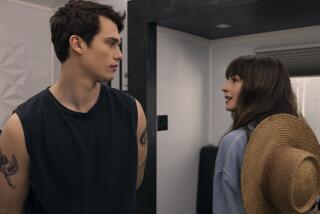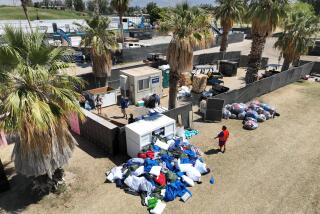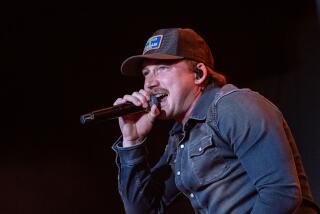60,000 Rap, Rock and Hop in Desert
INDIO, Calif. — For the record, sweat doesn’t dampen the sound of thundering guitars. It was ticking toward 3 p.m. and triple-digit temperatures Saturday when the Walkmen, a young band from New York, sent a tremor of power chords across the Empire Polo Field in this tiny desert city. The echo sent a message -- the kids (a record 60,000 plus) were back in town.
A week ago the vast green lawn belonged to affluent sportsmen and the horses they rode in on, but this weekend it was transformed by the Coachella Music and Arts Festival into a churning, sweaty, deafening hub of youth culture and music. More than a concert, the premier festival in California is a snapshot of edge music of the moment in the nation, and this year’s staging showed that, like a giant iPod set on shuffle, pop culture may be more random than ever in its playlist.
For the record:
12:00 a.m. May 4, 2006 For The Record
Los Angeles Times Thursday May 04, 2006 Home Edition Main News Part A Page 2 National Desk 0 inches; 25 words Type of Material: Correction
Coachella promoter: A story in Sunday’s Metro section about the Coachella Valley Music and Arts Festival misspelled concert promoter Paul Tollett’s last name as Tollet.
With hip-hop superstar Kanye West, the arch rockers Franz Ferdinand, Parisian electronica heroes Daft Punk and the strange soundscapes of Iceland’s Sigur Ros, the seventh annual Coachella was, depending on your view, either wildly scattered or exceptionally eclectic. In past years, the event split its sound between dance-tent throb and bohemian rock attitude, but the presence of West and Madonna (scheduled to play tonight) stuck a mainstream finger in the show’s indie eye.
The show itself was one of the smoothest operations in the franchise’s history, although the medical-aid tent was clogged with fans suffering from heat-related problems.
Tickets were sold in all 50 states and the audience came from six continents for the show that has established itself as the model for the modern festival in America.
But even with that proud position, Coachella is at a crossroads. Competitors have set up similar shows around the country; that has not hurt Coachella’s fan turnout, but it has created a poaching problem when it comes to booking a distinctive bill.
“It’s harder than ever,” said Paul Tollet, the event’s chief promoter. “The really difficult thing is that fans aren’t into just one type of music; they don’t say ‘I’m a rock fan,’ or ‘I’m a rap fan,’ they like everything. That’s made it very different than it was just a few years ago.”
There’s also some nagging concern about the changing landscape of the event, literally. Housing developments have recently encroached on the venue and there have been rumors of a change in the site’s ownership.
Tollet concedes that there have been “numerous substantial offers of very big money” but he says the owners of the property are committed to keeping it as it is and says he has a multiyear agreement to stage the event here, although he declined to provide details.
“I keep hearing from everyone out there,” he said, pointing to the field, “that this is the last Coachella here. Believe me, it’s not, we’re here to stay.”
Since its launch in 1999, Coachella has romanced fans not just with music but with an oasis-like setting and a halo of mountains that light up purple at twilight. Moving the show would be a potential calamity and, at the very least, a painful transition that could border on reinvention.
All of that, though, was a backstage issue for the thousands of music fans who braved the heat and long lines to soak up the festival’s massive serving of music. More than 90 acts are scheduled for the weekend, with today’s bill topped by Tool, Massive Attack, the Yeah Yeah Yeahs and, in a tent, pop superstar Madonna, whose booking stirred more than a little criticism from rock purists who cherish the festival.
On Saturday, there were two Coachellas -- a day Coachella, with its sunscreen and laid-back vibe, and a night Coachella, with its denser crowd and torqued-up energy level.
The Los Angeles band called the Like, a trio of young women, performed on the second stage at the height of the afternoon heat and their main challenge was stirring a crowd that seemed to be somewhat addled under the sun. Tennessee Thomas, the drummer, came off stage dizzy from the weather and her hands bloodied from thrashing her drum kit. “It was all a bit of blur out there,” she said, looking for a cool drink. “It is a bit warm, isn’t it? The crowd was great though.”
For the Like and other young bands, it was the biggest crowd of their career. Not so for Saturday night’s headliner, Depeche Mode, the British band that created a signature sound in the 1980s with songs laced with a decadent keyboard sound and grim, pulsing guitar.
It was the first festival since the early 1990s for Depeche, but they would look out at a crowd packed with loyal fans. It was a less certain environment for rapper West, who had the second-bestselling album of 2005, a claim to the fame that sets him apart from the festival’s usual acts; at Coachella, critical acclaim is usually more coveted than retail success.
But West, wearing a Miles Davis T-shirt and a red bandanna around his neck, took the stage to thunderous applause. As he launched into his hit single “Golddigger,” he called it “the new national anthem,” adding, “Even though the Grammys got it wrong, this was the song of the year.”
During the down time between bands, the sparsely populated lawn surrounding the outdoor stage, Coachella’s second-biggest venue, resembled a giant alt-rock picnic. People lazed on the grass sunning themselves. Guys with backward baseball caps munched on pizza while several young women applied suntan lotion to their tattoos as roadies for British space rockers the Zutons set up the group’s equipment.
The Coachella Music and Arts Festival is usually far more music than arts, but the organizers tried to even that up a bit this year.
In addition to the two huge stages and tall dance tent dotting the field, there were domes with performance artists and elaborate creations inside. The “summer” dome, for instance, contained a faux tropical forest and misting machines, while the “winter” tent had a deep-freeze motif that included a fake shark stuck in a glacier and refrigeration equipment that made it an especially popular spot to visit.
There were also, after nightfall, lightning machines that lighted up the center of the field with an impressive, crackling display. A film tent was set up this year, too, but one fan was using it more for shade than show.
“I just want to get out of the sun and I want it to be nighttime so I can dance,” said Chuck Farrior from San Francisco, tugging his hat down over his sunburned brow. “I love this and I’m having fun. But it’s more fun when the sun goes down and the music goes up.”
*
Times correspondent Chris Lee contributed to this report.
More to Read
The biggest entertainment stories
Get our big stories about Hollywood, film, television, music, arts, culture and more right in your inbox as soon as they publish.
You may occasionally receive promotional content from the Los Angeles Times.










